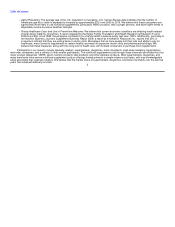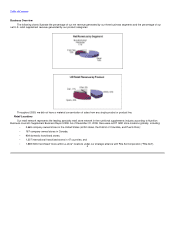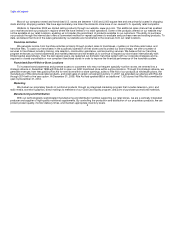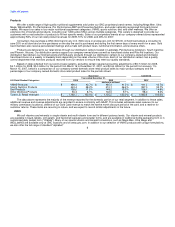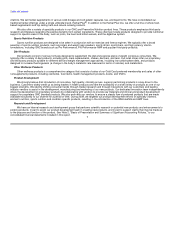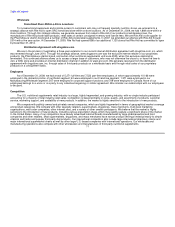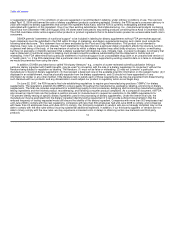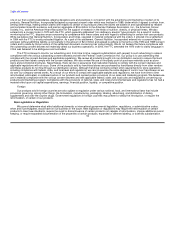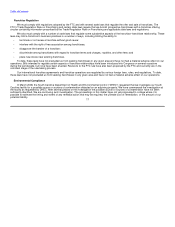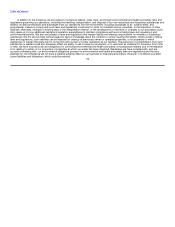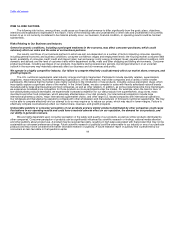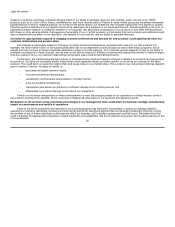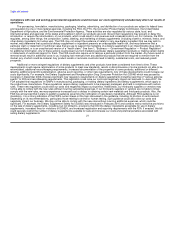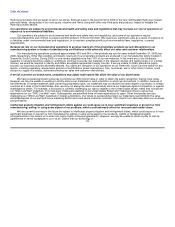GNC 2010 Annual Report Download - page 18
Download and view the complete annual report
Please find page 18 of the 2010 GNC annual report below. You can navigate through the pages in the report by either clicking on the pages listed below, or by using the keyword search tool below to find specific information within the annual report.
Table of Contents
Government Regulation
Product Regulation
Domestic
The processing, formulation, manufacturing, packaging, labeling, advertising, and distribution of our products are subject to regulation by
one or more federal agencies, including the Food and Drug Administration (the "FDA"), the Federal Trade Commission (the "FTC"), the
Consumer Product Safety Commission, the United States Department of Agriculture, and the Environmental Protection Agency. These activities
are also regulated by various agencies of the states and localities in which our products are sold. Pursuant to the Federal Food, Drug, and
Cosmetic Act ("FDCA"), the FDA regulates the formulation, safety, manufacture, packaging, labeling, and distribution of dietary supplements
(including vitamins, minerals, and herbs), and over-the-counter drugs. The FTC has jurisdiction to regulate the advertising of these products.
The FDCA has been amended several times with respect to dietary supplements. The Dietary Supplement Health and Education Act of
1994 ("DSHEA") established a new framework governing the composition, safety, labeling and marketing of dietary supplements. "Dietary
supplements" are defined as vitamins, minerals, herbs, other botanicals, amino acids, and other dietary substances for human use to
supplement the diet, as well as concentrates, metabolites, constituents, extracts, or combinations of such dietary ingredients. Generally, under
DSHEA, dietary ingredients that were marketed in the United States prior to October 15, 1994 may be used in dietary supplements without
notifying the FDA. "New" dietary ingredients (i.e., dietary ingredients that were "not marketed in the United States before October 15, 1994")
must be the subject of a new dietary ingredient notification submitted to the FDA unless the ingredient has been "present in the food supply as
an article used for food" without being "chemically altered." A new dietary ingredient notification must provide the FDA evidence of a "history of
use or other evidence of safety" establishing that use of the dietary ingredient "will reasonably be expected to be safe." A new dietary ingredient
notification must be submitted to the FDA at least 75 days before the initial marketing of the new dietary ingredient. The FDA may determine
that a new dietary ingredient notification does not provide an adequate basis to conclude that a dietary ingredient is reasonably expected to be
safe. Such a determination could prevent the marketing of such dietary ingredient. The FDA has announced that it plans to issue a guidance
governing notification of new dietary ingredients. While it is not mandatory to comply with FDA guidance, it is a strong indication of the FDA's
current views on the topic of the guidance, including its position on enforcement. Depending upon the recommendations made in the guidance,
particularly those relating to animal or human testing, such guidance could make it more difficult for us to successfully provide notification of
new dietary ingredients.
The FDA issued a consumer warning in 1996, followed by proposed regulations in 1997, covering dietary supplements that contain
ephedrine alkaloids, which are obtained from the botanical species ephedra and are commonly referred to as ephedra. In February 2003, the
Department of Health and Human Services announced a series of actions that the Department of Health and Human Services and the FDA
planned to execute with respect to products containing ephedra, including the solicitation of evidence regarding the significant or unreasonable
risk of illness or injury from dietary supplements containing ephedra and the immediate execution of a series of actions against ephedra
products making unsubstantiated claims about sports performance enhancement. In addition, many states proposed regulations and three
states enacted laws restricting the promotion and distribution of ephedra-containing dietary supplements. The botanical ingredient ephedra was
formerly used in several third-party and private label dietary supplement products. In January 2003, we began focusing our diet category on
products that would replace ephedra products. In early 2003, we instructed all of our locations to stop selling products containing ephedra that
were manufactured by GNC or one of our affiliates. Subsequently, we instructed all of our locations to stop selling any products containing
ephedra by June 30, 2003. Sales of products containing ephedra amounted to approximately $35.2 million or 3.3% of our retail sales in 2003
and $182.9 million, or 17.1% of our retail sales in 2002. In February 2004, the FDA issued a final regulation declaring dietary supplements
containing ephedra illegal under the FDCA because they present an unreasonable risk of illness or injury under the conditions of use
recommended 13


